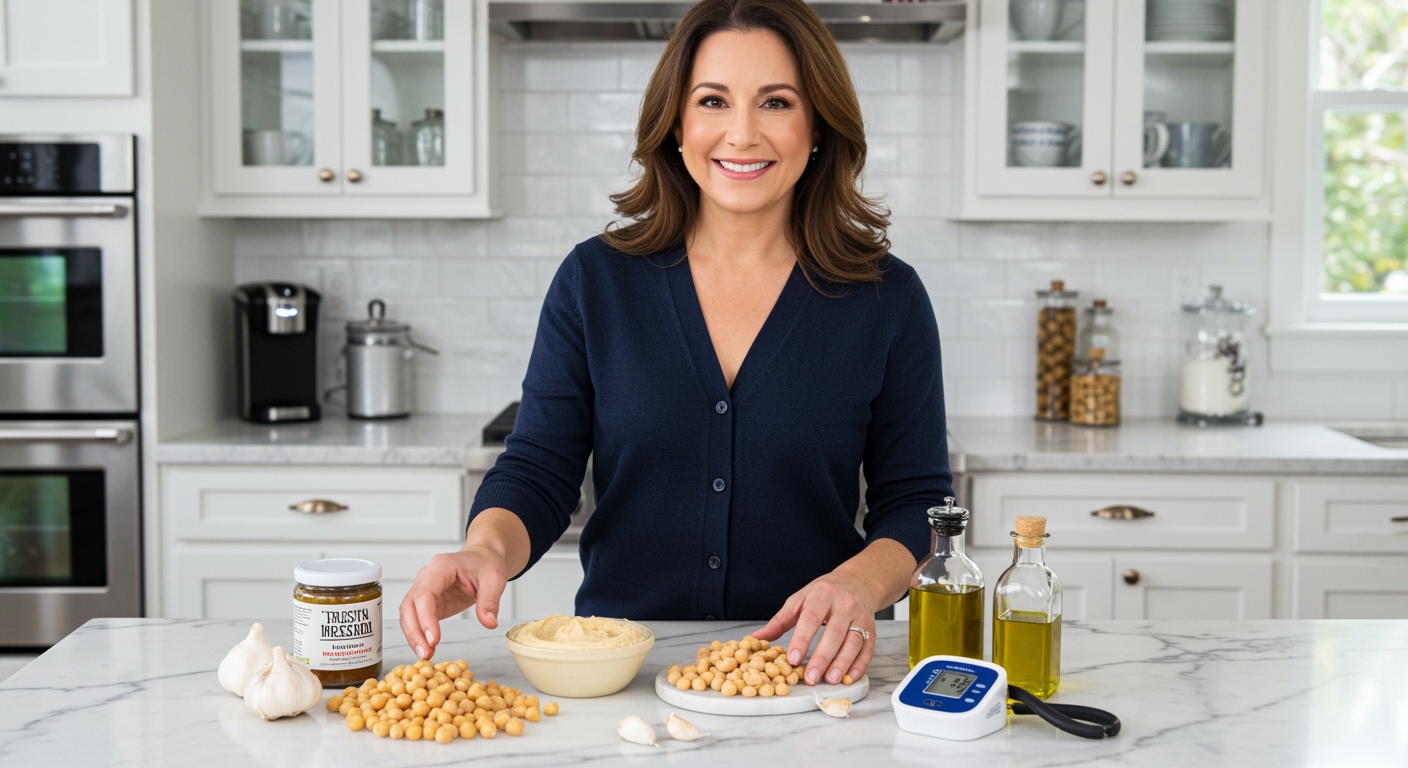✪ Key Takeaway: Hummus can help lower blood pressure through potassium, fiber, and healthy fats from chickpeas and olive oil.
Introduction
You grab that container of hummus from your fridge and wonder if this creamy dip actually helps your blood pressure numbers.
Maybe your doctor told you to watch your sodium intake, or perhaps you heard conflicting advice about whether hummus fits into a heart-healthy diet plan.
Hi, I’m Abdur, your nutrition coach and today I’m going to explain exactly how hummus affects your blood pressure and whether you should make it a regular part of your meals.
What Makes Hummus Heart-Healthy?
Hummus contains several key nutrients that directly support healthy blood pressure levels.
The main ingredient, chickpeas, provides about 291 milligrams of potassium per half-cup serving.
Potassium works like a natural sodium balancer in your body.
When you consume enough potassium, your kidneys can flush out excess sodium more effectively through your urine.
This process helps relax your blood vessel walls and reduces the pressure your heart needs to pump blood throughout your body.
Chickpeas also contain fiber and protein that help stabilize blood sugar levels.
Stable blood sugar prevents the spikes and crashes that can stress your cardiovascular system and contribute to higher blood pressure readings over time.
✪ Fact: One serving of hummus provides about 12% of your daily potassium needs.
How Does Olive Oil In Hummus Help?
Traditional hummus recipes include extra virgin olive oil, which brings its own blood pressure benefits.
Olive oil contains monounsaturated fats that help reduce inflammation in your blood vessels.
Chronic inflammation makes your arteries stiff and narrow, forcing your heart to work harder to push blood through your system.
The polyphenols in olive oil act like tiny repair workers in your cardiovascular system.
These compounds help your blood vessels stay flexible and responsive to changes in blood flow.
Research shows that people who consume olive oil regularly have lower systolic blood pressure compared to those who use other cooking oils.
The combination of chickpeas and olive oil in hummus creates a synergistic effect that supports your entire cardiovascular system.
✪ Pro Tip: Choose hummus brands that list olive oil as the second or third ingredient for maximum benefits.
Can Store-Bought Hummus Raise Your Blood Pressure?
Not all hummus products deliver the same heart-healthy benefits.
Many commercial brands add excessive sodium as a preservative and flavor enhancer.
Some store-bought varieties contain 200-400 milligrams of sodium per two-tablespoon serving.
This amount can quickly add up if you eat hummus regularly throughout the week.
High sodium intake causes your body to retain extra water, which increases blood volume and puts more pressure on your artery walls.
Some manufacturers also replace olive oil with cheaper inflammatory oils like soybean or canola oil.
These processed oils lack the beneficial compounds found in extra virgin olive oil and may actually contribute to cardiovascular inflammation over time.
✪ Note: Always check the ingredient list and choose hummus with less than 150mg sodium per serving.
What About Homemade Hummus For Blood Pressure?
Making hummus at home gives you complete control over ingredients and sodium content.
You can use low-sodium chickpeas or cook dried chickpeas without added salt.
Fresh garlic in homemade hummus provides additional cardiovascular benefits.
Garlic contains allicin compounds that help relax blood vessels and improve circulation.
Studies show that people who eat garlic regularly have lower blood pressure readings compared to those who avoid it.
Lemon juice in homemade hummus adds vitamin C, which supports healthy blood vessel function.
You can also experiment with herbs like rosemary or oregano that contain antioxidants beneficial for heart health.
✪ Pro Tip: Add a pinch of cumin to homemade hummus for extra flavor and anti-inflammatory benefits.
How Much Hummus Should You Eat Daily?
The ideal serving size for blood pressure benefits is about two to four tablespoons per day.
This amount provides meaningful levels of potassium and healthy fats without excessive calories.
Eating hummus with raw vegetables like carrots, celery, or bell peppers amplifies the cardiovascular benefits.
These vegetables add extra potassium, fiber, and antioxidants that work together to support healthy blood pressure.
You can spread hummus on whole grain bread or use it as a salad dressing for additional heart-healthy nutrients.
Timing matters too – eating hummus as an afternoon snack helps prevent blood sugar spikes that can stress your cardiovascular system.
Remember that hummus works best as part of an overall heart-healthy diet that includes plenty of fruits, vegetables, and whole grains.
✪ Fact: Eating hummus with vegetables can double your potassium intake compared to hummus alone.
The Bottom Line
Hummus can definitely be a valuable addition to your blood pressure management plan when you choose the right type and eat appropriate portions.
Small dietary changes create big health improvements over time, and hummus represents one of those simple swaps that can make a real difference in your cardiovascular health.
I would love to hear about your experience with hummus and blood pressure in the comments below – do you make your own or have you found a store-bought brand that works well for your health goals?
References
At NutritionCrown, we use quality and credible sources to ensure our content is accurate and trustworthy. Below are the sources referenced in creating this article:
- PMC: Nutritional and Health Benefits of Chickpeas and Hummus
- Cleveland Clinic: Is Hummus Good for You
- Nuffield Health: How to Lower Blood Pressure Through Diet
- BSW Health: Foods to Avoid with High Blood Pressure and What to Eat Instead





